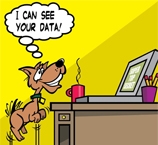by Consumer Reports
Threats to Your Personal Finances and Six ways to Stay Safer
Banking from a public computer
Keylogging malware that can capture account numbers, passwords, and other vital data is a risk that has been linked to use of open Wi-Fi connections and public computers such as those in hotel lobbies.
Using unfamiliar ATMs
Thieves have been known to put out-of-order signs on a legitimate ATM and set up nearby freestanding bogus ones that “skim” data from your card. ATMs located inside banks within view of surveillance cameras aren’t risk-free, but they pose more challenges for crooks installing skimming equipment.
Two other important pieces of advice related to ATMs: Separate your PIN code from your ATM or debit card. Almost 1 in 10 people carry their code with the card, says ACI Worldwide, a payment systems company. And when typing your PIN into an ATM or card reader, use your free hand to shield the keypad from the view of hidden cameras or anyone nearby.
Dropping your guard at gas pumps
Card-skimming at gas stations is likely to increase during summer months, especially in vacation areas, so use cash or credit cards at the pumps if possible. If you must use a debit card, select the option to have the purchase processed as a credit-card transaction rather than typing in your PIN.
Ignoring your credit or debit cards
Monitor your accounts at least weekly to spot and report unauthorized transactions as soon as possible. Use services offered by your bank or card issuer that can help protect you, such as an e-mail or text alert if a transaction occurs for more than a certain amount.
Abandoning your receipts
Many transactions, such as filling up your tank and making a debit-card withdrawal, leave a paper trail. Don’t toss away receipts in the ATM lobby or leave them at the gas pump. Hold on to them until your transactions have cleared your bank account to make sure the totals match. Then shred the receipts if they have any information a thief might use.
Trashing your bills
Thieves harvest sensitive data from account statements and other financial documents placed in the trash and use them for ID theft, says Inspector Michael Romano of the U.S. Postal Inspection Service. Shred them first.
6 Ways to Stay Safer
1. Watch out for imposters
The fastest-growing scam in the past year has been imposter fraud, according to the latest annual report on consumer complaints from the Federal Trade Commission. Thieves claiming to be someone they’re not (such as a friend or relative stranded overseas in need of cash to get home, a bill collector, or an employee of a government agency) use Facebook messages, e-mail, phone calls, and text messages to persuade people to send money or divulge personal information such as Social Security or account numbers. Last year, 60,000 people reported that they were affected by this form of fraud, up from just five cases reported in 2008.
2. Learn to parallel park
Car thieves are becoming more professional. They’re stealing new cars by putting them on a flatbed tow truck, our expert says. Parallel parking hinders access to the front and rear of your car, making it difficult to tow. Also, be careful about whom you bump into at the grocery store, especially if your car has keyless entry and a push-button ignition. A thief with an antenna and a small kit of electronics can transmit your key’s code to another thief standing near your car, allowing him to open it, start it, and drive it away.
3. Hide the stuff in your car
Don’t leave electronics and other valuables visible inside your car. GPS units are less of a magnet these days; cell phones and laptops more so. Holiday gifts are a big target, so don’t stack them up in the backseat. Is there a worse move? Yes. Leaving your stuff in the back of a pickup truck.
4. Change your PIN
Make it a habit to routinely change the secret code for your debit card or ATM card. That gives you better protection against any thieves or skimming schemes.
5. Keep a financial inventory
Once a year take out all of the cards in your wallet, make a list of the account numbers and contact information you’ll need to cancel cards if they become lost or stolen, and hide it in a safe place, says Mark Rasch, a former Department of Justice computer-crime prosecutor who is a director at CSC, a business technology firm based in Falls Church, Va.
6. Change your Wi-Fi password
If you have a home wireless network, choose the highest-security option. That way your Web-browsing and financial transactions will be more protected. Go a step further and create your own administrative password rather than rely on a default password supplied by the router.
Related titles to protect your personal & private information
8 ways to protect your Facebook privacy





May 16th, 2011 10:58 am
[…] Your Security For Your Personal Finances | DISC InfoSec blog […]
June 27th, 2011 8:58 am
[…] Your Security For Your Personal Finances (deurainfosec.com) […]